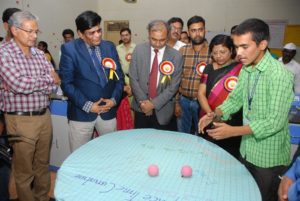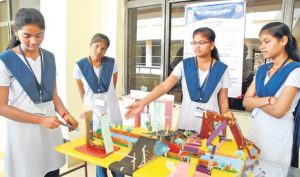
The world today is intensely driven by knowledge economy where consumption and production are both based on intellectual capital. A country which analyses the collected information effectively has better prospects of growth in future. The case of Finland is a classic example in this. After a World Economic Forum report (July 2014) by Ricardo Hausmann that pointed out that traditional wood related products from Finland barely accounted for 20 percent of their exports, Finland upgraded old machines and designed new automated ones to chop and cut the wood. It made Finland the top choice for designing and manufacturing automated machines for different purposes – Nokia, Kone, Fortum, and Fiskars being classic examples. Today 40 percent of Finland’s exports are all machines of various types.
 The above is a classic example of how knowledge economy is the key to growth. By its very definition, knowledge economy would require to partner with industry – the role of the partner being to gather, generate, disseminate and correlate information which industry can then use. Educational Institutions fit this role perfectly. A healthy partnership between the academia and industry will certainly see the development of knowledge economy which in turn will contribute to the growth of a country.
The above is a classic example of how knowledge economy is the key to growth. By its very definition, knowledge economy would require to partner with industry – the role of the partner being to gather, generate, disseminate and correlate information which industry can then use. Educational Institutions fit this role perfectly. A healthy partnership between the academia and industry will certainly see the development of knowledge economy which in turn will contribute to the growth of a country.
Despite stupendous work being done separately in Industry and academia, the level of collaboration seems either inadequate or failing in most cases. In the paper “Industry-academia collaborations in software testing: experience and success stories from Canada and Turkey; Software Quality Journal, 25(1091) 2017”, the authors have mentioned that correlation and interrelationship of challenges by proactively working together could eliminate the risk of challenges and possible failures in industry-academia interactions. These collaborations (as mentioned in Laredo, P, Revisiting the third mission of Universities: Towards a Renewed Categorization of University Activities; Higher Education Policy 20(4) 31-48 (2007)) are those which many MNCs engage in with Universities with the primary objective of teaching and educating students. Some such laudable initiatives are Cisco Network Academy, Oracle’s Work Force Development Program, IBM Career Education Program.
Also Read: RGUKT: Catering to the Educational Needs of Rural Youth
Traditionally, universities have been looked upon as knowledge centres – in the sense that they were seen to provide an education to the society and act as the custodians of knowledge. With dwindling resources to support them, Institutions of higher education are today increasingly looking to not only be knowledge centers, but also bring in industry collaboration in the academic pedagogy. Certain studies by scholars (Muscio et.al.; Does government funding complement or substitute private research funding to Universities? Research Policy, 42(1), 63-75 (2013)) have argued that industry engagement with academia for research and entrepreneurship brings in additional funds, which in turn could be ploughed back into enhancing the educational infrastructure.
It is important to note that it is not sufficient for Universities to merely host startups for Innovation through industry collaboration. As pointed out by Nicolas Colin – An eminent author in The Forbes (September 25, 2018), such missions only end up in ‘mere existence’ that produce nothing progressive. What is needed is a relentless entrepreneurial drive.
This being the case, especially in India, Corporate collaborations between young technology-led companies and research establishments are rapidly gaining ground with many business start-ups choosing to partner with Universities for cutting edge technology, as highlighted by J Vignesh in a leading newspaper on February 8, 2018. This trend seems to be fermented by the fact that universities remain the main source of resource persons who can engage in research while Industries need that leverage for developing technology.
Seen in this background, the Rajiv Gandhi University of Knowledge Technologies (RGUKT) Basar provides an excellent opportunity for being a test-bed for incubating industry-academic collaborations. Identified by the Government of Telangana as one of the Universities where Innovation, Incubation and Entrepreneurial Development programme will be established, the University is a residential campus that houses state-of-the-art laboratories and a young faculty community. The student community consists of the state-toppers who are bright and eager. These are invaluable assets where fermenting an industry-academia collaboration is being sought.
 The University has an MoU with TITA (Telangana IT Association) under which an Innovation hub called TIIC (Telangana Innovation and Incubation Center) has already been established in the campus. In the first phase, TIIC will host close to 15 industry startups and will also have space for a few student startups. IT professionals who are associated with TITA are mentoring the students and also helping bring in industry incubations to TIIC. SafeTraceHub, a Japanese company, has already established an Innovation laboratory in TIIC. At the time of this article appearing in press, more such start-ups are in the process of being incubated in the next few days at TIIC. RGUKT, Basar has a knowledge-base that is strong on contemporary technologies like Block Chain, Data Analytics, and Deep Learning etc. This provides a perfect platform for Industry to capitalise on the readily available knowledge-base and establish innovation start-ups. MoUs with a few industry leaders that will take the benefit of this readily available talent pool is underway.
The University has an MoU with TITA (Telangana IT Association) under which an Innovation hub called TIIC (Telangana Innovation and Incubation Center) has already been established in the campus. In the first phase, TIIC will host close to 15 industry startups and will also have space for a few student startups. IT professionals who are associated with TITA are mentoring the students and also helping bring in industry incubations to TIIC. SafeTraceHub, a Japanese company, has already established an Innovation laboratory in TIIC. At the time of this article appearing in press, more such start-ups are in the process of being incubated in the next few days at TIIC. RGUKT, Basar has a knowledge-base that is strong on contemporary technologies like Block Chain, Data Analytics, and Deep Learning etc. This provides a perfect platform for Industry to capitalise on the readily available knowledge-base and establish innovation start-ups. MoUs with a few industry leaders that will take the benefit of this readily available talent pool is underway.
RGUKT, Basar is also on the verge of signing MoUs with KIHT (Kalam Institute of Health Technologies). Under this MoU, KIHT will lend complete end-to-end support to help faculty and students of RGUKT, Basar to incubate startups that will be useful to the health sector – including medical diagnostics, medical devices, community health etc. The University has a rich expertise in domains of Signal processing (which can be very useful for biomedical signal processing), Machine learning, optical character recognition, IoT etc. – all of which are available for use in not just traditional applications for electronics but also in medical devices. RGUKT, Basar has qualified and experienced researchers in the domain of Drug synthesis, molecular modeling, Catalysis and green chemistry and Bio-inorganic chemistry which makes the upcoming MoU with KIHT an exciting prospect.
Another domain which the University is actively looking to encourage innovation is the domain of design of efficient power converters and smart charging algorithms – an invaluable asset for the development of electric vehicles and smart homes of the future. The University also has faculty experienced in the domain of solar PV systems which are today one of the KFAs where alternate, non- conventional sources of energy are concerned. RGUKT, Basar also has faculty experienced in the use of 3D printing in automotive industry, design of medical and surgical implants, tissues etc. The University has excellent equipment for fatigue testing, creep testing, corrosion studies, X-ray diffractometry, FESEM etc. which can be used for material characterization tests.
With a rich knowledge base and a pool of talented, well qualified and eager researchers, RGUKT, Basar today stands as a beacon that invites innovation and encourages entrepreneurs to take up the challenge of meeting the changing dynamics of the professional world. While becoming an entrepreneur may not be everybody’s cup of tea, an innovative spirit is definitely a great personal and institutional character to assimilate. In that aspect, RGUKT, Basar is making every effort to ensure it takes the right steps forward.






















